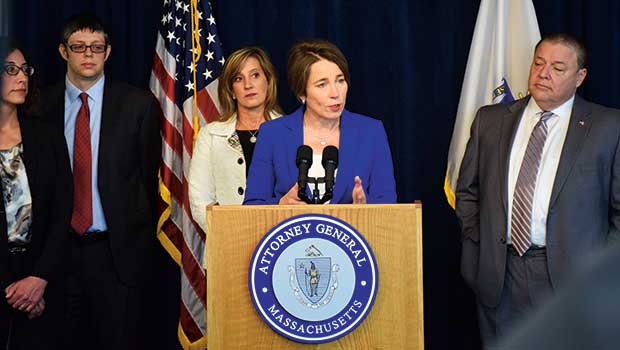AG Healey: Open market for electricity more costly
AG: Competitive power suppliers target low-income residents

A recent report commissioned by the Massachusetts Attorney General’s office found that hundreds of thousands of competitive electric supply customers paid nearly $180 million more for electricity than they would have paid their basic utility provider, as a result of deceptive sales practices that target vulnerable communities.
The study, prepared by consultant Susan M. Baldwin, analyzed billing data from July 2015 to June 2017.
The report was commissioned after the office received more than 700 complaints from residents who reported that their electric bill rates significantly increased despite being told otherwise, or that they were pressured into signing misleading contracts.
“We found that these companies focused on signing up people who can least afford it,” said Attorney General Maura Healey at a press conference held last week at her office.
“Our investigation found that one-third of low-income households in the state were signed up with competitive electric suppliers. That’s double the rate for higher income households,” she said.
Healey told reporters that although commercial, industrial or even municipal consumers are able to fairly shop around for competitive electric suppliers, “our study shows it’s been a really bad deal for individual, residential rate payers.”
She said, “Today, I am announcing my intention to work with the legislature, department of public utilities, as well as the energy industry’s civil rights and consumer advocates to end individual, residential competitive electric supply in Massachusetts.”
Joining the attorney general at the press conference was Thomas Koch, mayor of Quincy; Jenifer Bosco, staff attorney for the National Consumer Law Center; and Marci Pina-Christian, executive director of the Human Relations Commission and human services coordinator for the city of New Bedford.
“To see an industry take full advantage of these people on a daily basis, struggling to maintain their home or quality of life with their families, is very disturbing,” said Koch.
Bosco told reporters, “The report confirms what we’ve been hearing at the National Consumer Law Center for years from consumers and social workers.”
Deceptive tactics
Healey said that salespeople from competitive electric supply companies use tactics such as knocking on residents’ doors posing as National Grid employees and asking to see their electric bills, calling repeatedly and promising lower rates, aggressively pressuring the elderly, immigrant households or hearing-impaired residents to sign contracts, and incentivizing customers into recruiting their friends and family to sign on with the companies.
The study states that during the two-year period, more than 50 competitive electric suppliers were active in Massachusetts and served an average of approximately 493,349 households in Massachusetts.
For all competitive electric supply consumers, “These losses translate into an average household loss of $134 during the 2015–2016 study period and an average household loss of $226 during the 2016–2017 study period,” the report reads.
“I’m very excited for residents of New Bedford who have been greatly impacted by these deceptive tactics,” said Pina-Christian at the press conference. “You can just imagine the frustration when you’re living paycheck to paycheck and you think you’re going to save [but] you find your electric bill actually doubled.”






